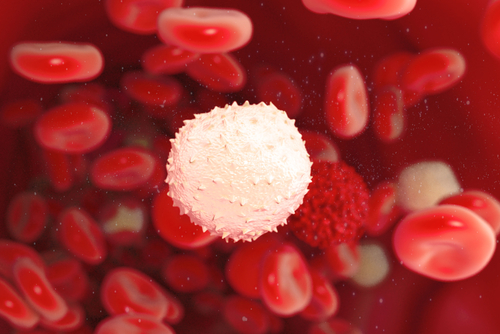Experimental SPMS Drug From Innate Immunotherapeutics Shows Success in Early Trials
Written by |

Under development at Innate Immunotherapeutics is a special drug candidate to treat secondary progressive multiple sclerosis (SPMS). Currently, no viable therapies exist for SPMS — only less-effective means to treat SPMS patients through drugs designed for relapse-remitting multiple sclerosis — making the prospect of Innate’s experimental SPMS therapy a promising one for progressive multiple sclerosis patients. So far, one completed phase 1 /2 clinical trial investigated the company’s drug, known as MIS416, in patients with SPMS or primary progressive multiple sclerosis (PPMS), and another phase 2B clinical trial is recruiting patients with SPMS in Australia.
As described by Innate Immunotherapeutics’ web page dedicated to MIS416, treatment stimulates signal transduction pathways in myeloid cells central to innate immune responses. According to Chief Executive Officer of Innate Immunotherapeutics, Simon Wilkinson, MIS416 is the only known drug candidate that targets and amplifies regulatory myeloid cell activities.
MIS416 comprises approximately 0.5 x 2.0 microns in size, containing naturally occurring proteins found in the body: TLR-9 and NOD-2 ligands. These particles target naturally anti-inflammatory myeloid cells, which are critical cells allowing the immune system to maintain homeostasis and initiate tissue repair pathways crucial to preventing deterioration in SPMS. A key feature of MIS416 is its specificity of activation, as cell activation occurs only when the microparticles are internalized and degraded within the cell to release the ligands. This is likely to be one of the reasons that trial outcomes to date have demonstrated a good safety profile for MIS416.
The idea for MIS416 was first imagined by Dr. Frank Gelder in the mid-1990s while working at Louisiana State University. MIS416 was part of his program initiated to develop passive immunotherapeutics to treat late-stage AIDS patients. Existing adjuvant therapeutics were not potent enough, and he wanted to create a microparticle-based adjuvant onto which he could attach anti-HIV antigens.
Dr. Gelder left LSU in the late 1990s and formed Virionyx Corporation (now Innate Immunotherapeutics) together with the late Dr. Wayne Watkins in New Zealand. The two initially focused on developing the anti-HIV therapy, but eventually halted the program after two new classes of antiretroviral drugs made passive immunotherapeutics non-commercializable in the HIV market.
[adrotate group=”4″]
When Innate Immunotherapeutics employed Dr. Gill Webster as the Company’s new Chief Scientific Officer in 2005, work began to evaluate the microparticle platform as a standalone agent to systemically modulate immune regulatory functions. Preclinical work indicated MIS416 could be important in remodeling deregulated immune activity for autoimmune disease treatment.
When studied in preclinical animal models, MIS416 twice weekly for four weeks or once weekly for 26 weeks was well tolerated. According to the company’s website, these doses are up to 20 times the intended dose for humans, and no side effects were explicitly adverse and occurred as a result of extended pharmacological effects.
Positive improvements in the patient’s health included reduced fatigue and body pain, improvement in core body strength, the ability to stand again, and return of arm and hand function, although the patient was not able to walk. Nonetheless, these improvements were enough to elicit treatment of another few SPMS patients for six to twelve months on compassionate grounds.
Springboarding off these studies, Innate Immunotherapeutics chose to target SPMS as the first MIS416-treated autoimmune condition after an interaction in late 2008 with a patient living with rapidly progressing SPMS. “This patient and her doctor wanted access to MIS416 under New Zealand’s compassionate use exemption in the country’s drug laws,” stated Wilkinson in an exclusive interview. “That ‘patient zero’ had a significant positive response to the drug after three to six months of weekly treatment.”
Other Patient stories from Innate’s early studies indicate the impact of MIS416 on their lives with SPMS.”I can concentrate on what I’m doing, hand eye coordination is better, spacial awareness is better,” said Stephen, a man with SPMS, after he sipped water from a glass and placed it steadily on a table behind him. “And just doing lots of normal things that everyone takes for granted that you weren’t able to do when you weren’t on the drug.”
“Allows me to drive. Now I can go everywhere on my own, I don’t need a driver,” said Mary, a fellow SPMS patient. “I don’t have to wait for someone to come around to doing things,” she said when asked what she could do that she could not before MIS416.
In late 2009, Innate Immunotherapeutics submitted anecdotal, uncontrolled (for placebo effect) data from compassionately treated patients to the United States Multiple Sclerosis Society for evaluation. An award of $550,000 (USD) was granted from the Society’s “Fast Forward” program to partially fund a formal clinical trial program. Phase 1 (first in man) trial requirements were waived due to compassionate use data already collected.
Recognizing the importance of MIS416, the National Multiple Sclerosis Society in the United States and Multiple Sclerosis Research Australia both declared their support for the current phase 2B clinical trial. “The Society is particularly pleased with the trial’s focus on the secondary progressive form of MS,” wrote Timothy Coetzee, PhD, Chief Research Officer of the National Multiple Sclerosis Society. “There is a significant need for treatments that address SPMS.”
Added Dr. Matthew Miles, Chief Executive Officer of Multiple Sclerosis Research Australia, “This is an area of urgent unmet need for people with MS world-wide.” He further indicated the excitement surrounding MIS416 and the potential in brings in treating patients with SPMS.
Innate continues to seek out people with secondary progressive multiple sclerosis in Australia to participate in their ongoing clinical trial for MIS416. More information about the trial and its criteria can be found HERE.
Alternatively interested SPMS sufferers in Melbourne, Perth, Brisbane and Adelaide can ring a patient hotline 1800 231 173 (Australia only) for more information.



